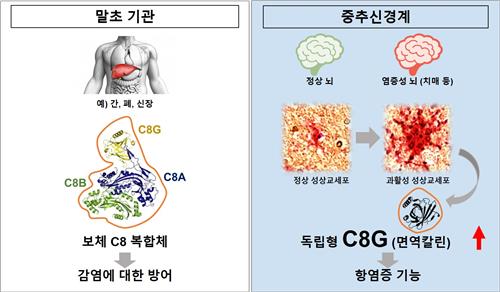Kyungpook National University Medical School Research Team “Used for Dementia Diagnosis and Treatment”

[석경호 교수 제공. 재판매 및 DB 금지]
(Daejeon = Yonhap News) Reporter Park Joo-young = The National Research Foundation of Korea announced on the 6th that the research team of professors Gyeong-ho Seok and Jong-heon Kim of the Kyungpook National University Medical School discovered the protein’C8-gamma’ that suppresses brain inflammation, which is the cause of dementia.
Minor brain inflammation immediately recovers, but if excessive, it causes irreversible brain damage, causing degenerative brain diseases such as dementia.
The research team observed that the C8-gamma protein concentration was higher than that of the normal group in brain models of brain inflammation and dementia animals and dementia patients.
It was then confirmed that acute brain inflammation induces C8-gamma secretion by stimulating astrocytes that help neurons survive and activate.
C8-gamma, which has increased expression in astrocytes, decreases the activity of microglia, which produces inflammatory substances, thereby inhibiting the brain inflammatory response and alleviating the symptoms of dementia.

[석경호·류훈 교수 제공. 재판매 및 DB 금지]
C8 protein exists outside the brain as a C8-complex in which alpha, beta, and gamma are combined, but inside the brain, it was confirmed that astrocytes secrete only the C8-gamma protein in an independent form.
Professor Kyungho Seok said, “C8-gamma protein is a protein that is specifically expressed only in the brain, and will contribute to the diagnosis of dementia and the development of treatments.
The results of this research, jointly conducted with the Korea Institute of Science and Technology (Dr. Ryu Hoon and Hwang Eun-mi) and the Korea Brain Research Institute (Hyang-Sook Heo and Dr. Young-Sik Choi), were published in the international journal’Brain’ on December 31 of last year.
Unauthorized reproduction-prohibition of redistribution>
2021/01/06 12:00 sent
